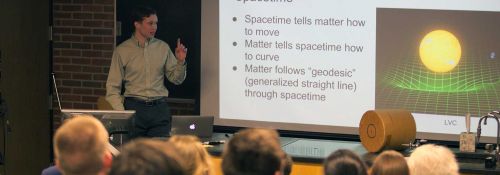
Physics for Everyone
Written by Katarzyna Ignatik
In a lecture for Physics 100, you might find yourself watching video clips of Neil Armstrong land on the moon, or laughing over Double Rainbow Guy, or observing your professor blowtorch a strip of metal.
Hillsdale introduced this new physics class into its core science curriculum last year. Previously students took one joint class covering both chemistry and physics, but now all non-science majors are required to take one full semester of each. According to Dr. Paul Hosmer, assistant professor of physics, the physics department began to develop this stand-alone physics core class five to six years before the change was actually implemented.
“The sciences are an important component of the liberal arts education,” Dr. Hosmer said. “Students at Hillsdale take at least one full semester each of English, religion, philosophy…so they should also take one full semester each of biology, chemistry, and physics.”
Dr. Hosmer explained that physics is an important subject to study, as it examines the fundamental operations of nature and how it functions.
“Physicists try to find answers to questions people have been asking for thousands of years. What is the nature of time? The nature of space? What is everything made of? How big is the universe? What is motion?”
When creating Physics 100, the department tried to design a course that would help students enjoy answering these questions and look past the complicated equations that deter many people from physics. Their hope is that by removing these barriers, more students will appreciate what is perhaps the last or only physics class they take.
Current sophomore Nina Hufford took Physics 100 with Dr. Kenneth Hayes the first semester it was offered and praises its impact.
“Dr. Hayes made me appreciate the universe with new eyes,” she said. “I appreciate the class for the spirit of curiosity and delight it fostered.”
The course focuses largely on astronomy, a concept Dr. Hosmer said many people find inherently interesting.
“It’s very visual, very beautiful,” he said. “Astrophysics is also a vehicle to talk about other physics concepts, like stars, nuclear physics, thermodynamics.”
Since the Physics 100 course is newly developed, it is still in somewhat of an experimental mode. Students who take the course are requested to fill out thorough surveys at the end of each semester, and the College continues to develop the course to better fit students’ needs.
 Katarzyna Ignatik is an English major in the class of 2020. She spends her time doing homework (of course), binge-reading, binge-writing, singing, and laughing at everything and anything. Talk to her about Tolkien, the 50s, or abstract philosophical concepts, and she’ll be perfectly happy.
Katarzyna Ignatik is an English major in the class of 2020. She spends her time doing homework (of course), binge-reading, binge-writing, singing, and laughing at everything and anything. Talk to her about Tolkien, the 50s, or abstract philosophical concepts, and she’ll be perfectly happy.